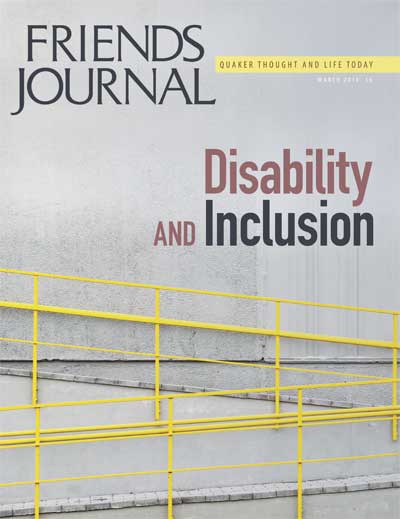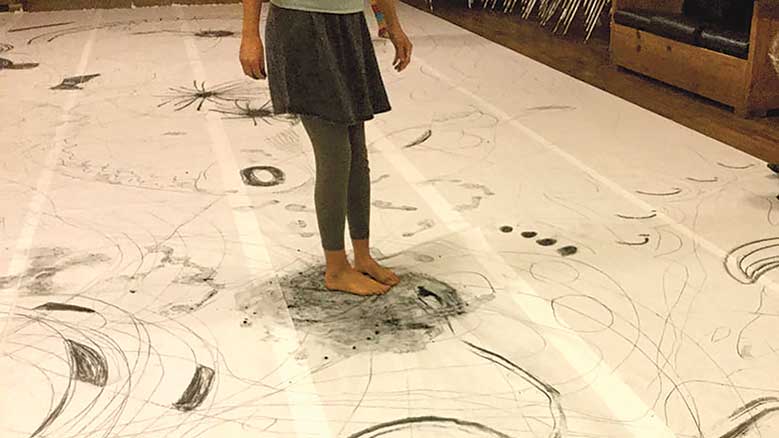
At 82 I hired my first employee, a 24-year-old college graduate with a year of nursing training. I’ll call her Sara. She agreed to work 20 hours a week for the first five months, then on May 1 increase to 40 hours a week; her tasks included caregiving, cooking, shopping, housekeeping, and gardening. Her help would make it possible for my husband, who has Parkinson’s disease, and me, with mobility issues requiring surgeries, to stay in our own home. In the contract I wrote for us to cosign, I was led to include a weekly hour of sharing about our ups and downs, including any necessary threshing through to make decisions. Although we are very kindred, I assumed we would run into differences, prompting us to discern among options, sort wheat from chaff. Sara was not familiar with Friends traditions, but she warmed to the term “threshing” because she and her husband, Nate, are committed to farming as their future way of life.
As May approached, we badly needed such sharing time. Sara had agreed to help me clear out our upstairs so that she and Nate could move in just before May Day. I have been an avid reader; a writer of poems, stories, and letters; and a counselor with reams of case notes. The books and papers were the hardest for me to sort and part with. Sara was invaluable in finding boxes and labeling them but grew anxious as the weeks passed and the second floor rooms were still cluttered. She made a calendar of time left, with deadlines for when each of the four rooms involved would be emptied out.
I felt more and more stressed. I had a big weep about the discards I culled out and the identity issues those choices raised. The pace we expected to keep up was shivering my timbers. As we leveled with each other and threshed out the matter, it came clear to Sara that renting a storage unit in a nearby town would be a way of slowing down the sorting process while clearing the decks for them to move in. Despite the expense, this opening proved to be a real boon.
As Sara settled into her 40-hour weeks, we mostly chose Friday afternoons to sort through our five days of experiences. We fell into a pattern of first celebrating plans that had gone well, such as making a new soup or finding a way to round off the evening that helped my 82-year-old hubby head willingly for toothbrush and bed before he got disoriented or fell. We recalled blessings each gave the other by being especially thoughtful about needs, such as buying a necessity that wasn’t on the shopping list, rewriting a tattered recipe card that had been nearly illegible, or staking up a listing plant.
Then we usually confessed some interactions between us or ways of doing things that “got our goats,” such as explaining something the other already knew or forgetting to clear pants pockets of tissues before putting them into the washer. One night, after Sara had overdone it with spices in the soup, I had a brief nightmare. She was serving us pizza with a crust made of over-fried hamburger studded with chocolate chips. Merriment is definitely part of our “goat-getting” confession time. Even though I was trying to be kind, Sara objected to my protectiveness toward her when she was carrying heavy things. I had learned she had had fibromyalgia earlier in life. She snorted at my assumption that she is weak. On the other hand, she wanted to protect me from overdoing it when I yearned to prove I am still capable in spite of my age.
It is painful to hear resentments and criticisms, but it is also honest and intimate. It makes us closer because we are leveling with each other. There are tears. Some of our friction is related to generational differences. Our old role models are inevitably different from each other’s in some ways. At times each of us has a sense of inadequacy as we try to meet expectations we assume are in the other. It helps to make our assumptions visible.
Our conversations often bring us to tough challenges we are facing together. We try to think of ways to cope with my memory loss and to deal with my husband’s urgencies as his Parkinson’s disease undercuts more and more of his logic. We have threshed through our dilemma about how to respond to his negativity toward exercising. He needs to keep up his strength to avoid falling and to save me from straining my back, but we don’t want to force him to do things. Ultimately, it came clear that he, as an old hiker, yearns to walk outdoors. With Sara to pick him up if he falls, morning walks have become his favorite kind of bodybuilding.
As we sort things out together, we develop trust and mutual regard. I sense our Inner Light at work. The Presence is sometimes palpable. Our sessions make us hopeful, determined to support each other’s efforts. When it is time to break and cook supper, we always embrace.




Comments on Friendsjournal.org may be used in the Forum of the print magazine and may be edited for length and clarity.